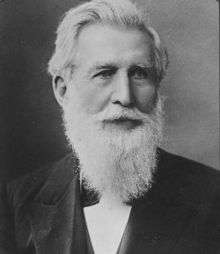Adye Douglas
| Sir Adye Douglas | |
|---|---|
 | |
| 15th Premier of Tasmania | |
|
In office 15 August 1884 – 8 March 1886 | |
| Preceded by | William Giblin |
| Succeeded by | James Agnew |
| Constituency | Launceston, Westbury, Norfolk Plains, Fingal |
| President of the Tasmanian Legislative Council | |
|
In office 20 April 1894 – 2 May 1904 | |
| Preceded by | William Moore |
| Succeeded by | William Dodery |
| Personal details | |
| Born |
31 May 1815 Thorpe-next-Norwich, Norfolk, England, United Kingdom |
| Died |
10 April 1906 (aged 90) Hobart, Tasmania, Australia |
| Political party | Separationist |
| Spouse(s) | Martha Matilda Collins (née Rolls), Charlotte Richards, Ida Richards |
| Profession | Lawyer |
| Religion | Anglican |
Sir Adye Douglas (31 May 1815 – 10 April 1906) was an Australian lawyer and politician, and first class cricket player, who played one match for Tasmania. He was Premier of Tasmania from 15 August 1884 to 8 March 1886.
The son of Captain Henry Osborne Douglas, and his wife Eleanor, Douglas was born in Thorpe, Norfolk, England of Scottish descent. His father was an army officer, but his grandfather, Billy Douglas was an admiral and five uncles were post-captains. Douglas was educated in Hampshire and Caen, France, before doing his articles with a Southampton law firm. He migrated to Van Diemen's Land (now Tasmania) aboard the Louisa Campbell in 1839.
Douglas was admitted to the Supreme Court of Tasmania, but went to Victoria where he ran a sheep farm near Kilmore with his brother. He tired of farming, and in 1842 he returned to Launceston, where he established his own law firm, which still operates today.
Douglas was very interested in the development and welfare of the colony, and was a supporter of both the establishment of local responsible government and the name change from Van Diemens Land to Tasmania. He was also a strong advocate of the Anti-Transportation League.
Ayde Douglas played his only first class cricket match at South Yarra Ground, Melbourne, on 29 and 30 March 1852 for Tasmania against Victoria. He scored a duck in the first innings, and 6 in the second. He also took 0/5 off 2 overs in Victoria's second innings.
Douglas was elected as an alderman of Launceston in 1852, and served until 1884, including two terms as mayor from 1865–1866, and 1880–1882.
In 1856 Douglas was one of the first representatives elected to Tasmania's new House of Assembly, but was soon frustrated by lack of support. He resigned in 1857 to travel in North America, France, and England, before soon returning to Tasmania.
Whilst abroad, Douglas had been impressed by the development of railways in those places, and felt strongly that Tasmania needed to develop its own railways. He failed to gain support for the development of a Hobart to Launceston railway, but did push through a Launceston to Deloraine railway.
Douglas was a member of the Tasmanian House of Assembly from 1862 until 1884, when he became a member of the Tasmanian Legislative Council instead. He served as Premier of Tasmania from 1884 until 1886.
Douglas represented Tasmania at the Federal Council of Australasia, where he not only supported the creation of a federation, but wanted to go further and promoted the establishment of an Australian Republic.
Douglas resigned as Premier in 1886 to take up a post as Tasmanian Agent-General in London, but was soon recalled due to problems with his railway associations in Tasmania. He returned to the Tasmanian Legislative Council from 1890 to 1904, and was knighted in 1902, being described as "The first amongst the Tasmanians", by then Governor of Tasmania, Captain Sir Arthur Havelock.
Douglas had three sons and a daughter in the 1840s. He married Martha Matilda Collins in 1858, but they had no children. In 1873, he married Charlotte Richards, and they had a daughter Eleanor, before she died in 1876. In 1877, he married Charlotte's sister, Ida, in Adelaide, and they had four sons, and four daughters.
Sir Adye Douglas died on 10 April 1906, in Hobart, Tasmania, aged 90 years and 314 days.
See also
References
- Parliamentary Library profile
- Cricinfo Profile
- P. T. McKay, F. C. Green, 'Douglas, Sir Adye (1815 - 1906)', Australian Dictionary of Biography, Volume 4, MUP, 1972, pp 87–88.
- Serle, Percival (1949). "Douglas, Adye". Dictionary of Australian Biography. Sydney: Angus and Robertson. Retrieved 2008-10-01.
| Political offices | ||
|---|---|---|
| Preceded by William Giblin |
Premier of Tasmania 1884 – 1886 |
Succeeded by James Agnew |
| Tasmanian Legislative Council | ||
| Preceded by William Moore |
President of the Tasmanian Legislative Council 1894–1904 |
Succeeded by William Dodery |
| Preceded by Richard Dry |
Member for Launceston 1855–1856 Served alongside: Ronald Gunn |
Abolished |
| Preceded by Charles Leake |
Member for South Esk 1884–1886 |
Succeeded by James Gibson |
| Preceded by John Scott |
Member for Launceston 1890–1904 Served alongside: William Hart |
Succeeded by Charles Russen |